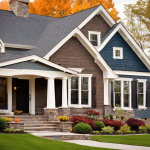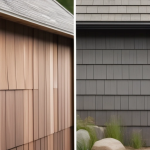Coastal Home Defense: Selecting the Right Windows and Siding for Cape Cod’s Climate
Cape Cod’s Coastal Challenge: Protecting Your Home
Cape Cod, Massachusetts, a picturesque peninsula jutting into the Atlantic, is renowned for its stunning beaches, historic charm, and vibrant communities. However, this coastal paradise presents unique challenges for homeowners seeking effective coastal home defense. The relentless assault of salt spray, high winds, and fluctuating humidity demands careful consideration when selecting building materials, especially windows and siding. Choosing the wrong materials can lead to premature deterioration, costly repairs, and decreased energy efficiency, impacting both the structural integrity and aesthetic appeal of your home.
This guide provides a comprehensive overview of selecting the right windows and siding to protect your Cape Cod home, ensuring its longevity and preserving its aesthetic appeal while adhering to local building codes. Beyond the immediate concerns of weather protection, the selection of windows and siding profoundly impacts a home’s energy efficiency. In Cape Cod’s climate, where seasonal temperature swings are significant, energy-efficient windows and siding can dramatically reduce heating and cooling costs. Features like low-E coatings on windows and insulated siding options contribute to a more comfortable indoor environment and lower utility bills.
Moreover, selecting materials that meet or exceed Energy Star standards not only benefits your wallet but also contributes to a more sustainable lifestyle, aligning with the growing trend of eco-conscious home improvement. Furthermore, the architectural character of Cape Cod homes often dictates specific aesthetic considerations. While modern materials offer superior weather resistance, maintaining the traditional charm is paramount. For example, while cedar shingles are a classic choice, requiring regular maintenance, fiber cement siding can mimic the look of cedar while providing enhanced durability and resistance to pests and fire. Similarly, wood windows offer a traditional aesthetic, but vinyl or fiberglass windows can provide similar visual appeal with significantly less upkeep. Balancing aesthetic preferences with practical performance is key to making informed decisions for your coastal home defense strategy. Investing in quality windows and siding is an investment in your property’s long-term value and resilience.
Understanding the Coastal Elements: Salt, Wind, and Humidity
Salt spray, an insidious threat to Cape Cod homes, acts as a catalyst for decay. Beyond the mere cosmetic blemishes of peeling paint and blistered surfaces, the chloride ions present in salt aggressively attack metals, leading to rust and corrosion of fasteners, hinges, and even structural components. This necessitates careful material selection, favoring corrosion-resistant options like stainless steel or specialized coatings. Consider, for instance, the long-term implications of using standard nails versus marine-grade fasteners when installing cedar shingles; the latter, though initially more expensive, significantly extends the lifespan of the siding and prevents unsightly rust stains that detract from a coastal home’s aesthetic appeal.
Building codes in coastal areas often mandate specific corrosion-resistant materials due to the severity of salt spray exposure, emphasizing the importance of adherence for long-term structural integrity and coastal home defense. High winds, particularly prevalent during Nor’easters and hurricane season, pose a significant threat to windows and siding. The sustained pressure and sudden gusts can compromise the integrity of even seemingly robust materials. Windows, in particular, are vulnerable points, and selecting those with a high Design Pressure (DP) rating is crucial.
A higher DP rating indicates the window’s ability to withstand greater wind loads without deformation or failure. Similarly, siding materials must be securely fastened to the underlying structure to prevent blow-offs. Fiber cement siding, like James Hardie siding, offers excellent wind resistance when installed according to manufacturer specifications, often exceeding the performance of traditional cedar shingles in high-wind conditions. Proper installation, adhering to stringent building codes, is paramount to ensure that windows and siding can withstand the forces exerted by extreme weather events, providing essential storm protection.
Humidity, often an overlooked element, contributes significantly to the degradation of building materials on Cape Cod. The persistent moisture creates an ideal environment for mold and mildew growth, which can not only compromise the structural integrity of wood-based materials but also pose serious health risks to occupants. Wood windows, while aesthetically desirable, are particularly susceptible to rot and decay in humid coastal climates unless meticulously maintained with regular painting and sealing. Vinyl windows and fiberglass windows offer superior resistance to moisture and require minimal maintenance, making them practical choices for coastal home defense. Furthermore, proper ventilation and moisture management strategies, such as vapor barriers and adequate insulation, are essential to mitigate the effects of humidity and prevent long-term damage to the building envelope. Addressing humidity is a critical aspect of home maintenance in coastal environments, contributing to both the longevity of building materials and the overall health of the indoor environment.
Window Material Comparison: Vinyl, Wood, and Fiberglass
Windows are a critical component of a coastal home defense strategy, particularly on Cape Cod where they face a relentless barrage of harsh weather conditions. Selecting the right window material is paramount for long-term performance and protection. Vinyl windows have emerged as a popular choice due to their excellent resistance to salt spray and moisture, a pervasive issue in coastal environments. Their inherent composition makes them impervious to rot and corrosion, significantly reducing the need for ongoing maintenance.
According to a 2023 study by the American Window Manufacturers Association, vinyl windows require approximately 75% less maintenance than traditional wood windows, making them a cost-effective solution for Cape Cod homeowners seeking long-term value and minimizing upkeep expenses in the face of challenging coastal conditions. Wood windows, while undeniably possessing a classic aesthetic that complements the architectural charm of many Cape Cod homes, demand a higher level of commitment to maintenance. Their natural beauty comes at the cost of susceptibility to rot, insect infestation, and moisture damage, particularly in the face of constant humidity and salt exposure.
Regular painting and sealing are essential to preserve their integrity and prevent deterioration. This ongoing maintenance can be time-consuming and costly. As Bob Vila, the renowned home improvement expert, advises, “If you choose wood windows in a coastal environment, be prepared for a rigorous maintenance schedule. Neglecting upkeep will inevitably lead to premature failure and costly repairs.” Therefore, homeowners must carefully weigh the aesthetic appeal of wood against the practical demands of coastal living. Fiberglass windows represent a premium option, offering a superior balance of durability, energy efficiency, and aesthetic appeal.
Their exceptional strength and resistance to the elements make them an ideal choice for withstanding high winds and impact from debris during storms, common occurrences on Cape Cod. Fiberglass windows are also highly energy-efficient, contributing to lower heating and cooling costs. While the initial investment may be higher compared to vinyl or wood, the long-term benefits of reduced maintenance, enhanced energy performance, and superior durability often justify the cost for homeowners seeking a high-performance coastal home defense solution. When evaluating window options, consider local building codes related to coastal construction and storm protection, ensuring that your choice meets or exceeds these requirements. Furthermore, inquire about warranties and certifications to guarantee the quality and performance of your windows.
Siding Options: Cedar Shingles, Fiber Cement, and Vinyl Siding
Siding serves as the coastal home defense’s primary shield against the relentless elements. The choice of siding material is a critical decision, influencing not only the aesthetic appeal of your Cape Cod home but also its long-term resilience against salt spray, high winds, and humidity. Cedar shingles, synonymous with classic Cape Cod architecture, evoke a sense of timeless charm. However, this natural beauty comes at a price: cedar is highly susceptible to moisture damage, requiring vigilant maintenance in the form of regular staining, painting, and treatment with preservatives to prevent rot and decay.
Neglecting this upkeep can lead to costly repairs and premature replacement, diminishing the long-term ROI. Fiber cement siding, exemplified by James Hardie siding, presents a compelling alternative. Engineered for durability, fiber cement offers exceptional resistance to fire, pests, and the corrosive effects of salt spray. Its ability to mimic the appearance of natural wood provides homeowners with aesthetic flexibility without the associated maintenance burdens. James Hardie siding, in particular, is designed with HardieZone technology, tailoring the siding’s composition to withstand specific regional climates, making it a robust choice for the demanding coastal environment of Cape Cod.
Furthermore, its resistance to swelling and warping ensures a longer lifespan compared to traditional wood siding, contributing to long-term cost savings. Vinyl siding remains a budget-conscious option, prized for its ease of maintenance. Unlike cedar, vinyl requires no painting or staining, offering a low-effort solution for homeowners. However, its aesthetic limitations and potential for fading or cracking under extreme weather conditions should be carefully considered. While advancements in vinyl siding technology have improved its durability and appearance, it may not provide the same level of structural integrity or aesthetic sophistication as fiber cement or well-maintained cedar. Ultimately, the optimal siding choice hinges on a careful evaluation of your budget, desired aesthetic, tolerance for home maintenance, and the specific weather protection needs of your Cape Cod property, always ensuring compliance with local building codes.
Product Recommendations: Energy Efficiency and Storm Protection
When fortifying your Cape Cod coastal home defense, prioritize products engineered for extreme weather. Windows, in particular, should boast a high Design Pressure (DP) rating, a crucial metric indicating their capacity to withstand significant wind loads. Exceeding local building codes is advisable, especially given the region’s vulnerability to Nor’easters and hurricanes. Energy Star certified windows with low-E coatings are also essential, mitigating heat transfer during scorching summers and frigid winters, thereby enhancing energy efficiency and reducing utility costs.
These coatings selectively filter solar radiation, minimizing glare and preventing fading of interior furnishings, a common concern in sun-drenched coastal homes. For siding, James Hardie siding with HardieZone technology offers a tailored approach to weather protection. This engineered fiber cement siding is specifically formulated for distinct climate zones, providing superior resistance to moisture intrusion, salt spray, and temperature fluctuations prevalent on Cape Cod. Unlike traditional cedar shingles, which demand regular upkeep to prevent weathering and decay, fiber cement siding resists rot, pests, and fire, offering a low-maintenance, long-lasting solution.
Consider the specific HardieZone product recommended for the Cape Cod region to ensure optimal performance and longevity. Beyond specific brands like Andersen Windows (Fiberglass or Vinyl), Harvey Building Products (Vinyl), CertainTeed Siding (Fiber Cement and Vinyl), and Maibec (Eastern White Cedar shingles), homeowners should scrutinize product specifications and warranties. Fiberglass windows, while often a premium choice, offer exceptional durability and resistance to warping, making them a worthwhile investment for coastal properties. When considering cedar shingles, explore options pre-treated with preservatives to enhance their resistance to moisture and decay. Regardless of the chosen materials, always verify product compliance with local Cape Cod building codes, paying particular attention to requirements for wind resistance, impact resistance, and coastal construction standards. This diligent approach ensures both safety and long-term structural integrity for your coastal home.
Installation Best Practices: Maximizing Longevity
Proper installation is the bedrock of effective coastal home defense, directly impacting the longevity and weather resistance of both windows and siding, especially on Cape Cod. Ensuring that windows are meticulously sealed is paramount to prevent water infiltration, a common culprit behind structural damage and mold growth in humid coastal environments. This sealing process involves not only applying high-quality caulk but also integrating flashing correctly around window frames, a detail often overlooked but critical for diverting water away from the building envelope.
Ignoring these best practices can lead to costly repairs down the line, negating any initial savings from cheaper materials or rushed installations. Building codes in Cape Cod often have specific requirements for coastal construction, so adherence to these regulations is essential for both safety and compliance. Selecting the appropriate fasteners for siding installation is another crucial aspect of a robust coastal home defense strategy. Given the prevalence of salt spray, using corrosion-resistant fasteners, such as stainless steel or hot-dipped galvanized nails and screws, is essential to prevent rust and staining, which can compromise the integrity and appearance of the siding.
This is particularly important for materials like cedar shingles, where rust stains can detract from their natural beauty. For fiber cement siding, like James Hardie siding, using the manufacturer’s recommended fasteners ensures proper attachment and helps maintain the product’s warranty. Paying attention to these details during installation significantly extends the lifespan of the siding and minimizes future maintenance needs. Ultimately, successful window and siding installation in a coastal environment demands meticulous attention to detail and a thorough understanding of best practices.
Following manufacturer’s instructions is non-negotiable, as these guidelines are tailored to the specific product and its performance requirements. Moreover, given the complexities of coastal construction, engaging a qualified contractor with proven experience in Cape Cod is a wise investment. These professionals possess the expertise to navigate the unique challenges posed by salt spray, high winds, and humidity, ensuring that your windows and siding are installed correctly and will provide long-lasting protection for your home. This proactive approach not only safeguards your investment but also contributes to the overall resilience and value of your coastal property.
Maintenance Tips: Preventing Damage and Extending Lifespan
Regular maintenance is paramount for preserving the integrity and extending the lifespan of both windows and siding, especially in the challenging Cape Cod coastal environment. The relentless assault of salt spray, driven by high winds, necessitates frequent cleaning. Washing windows and siding at least twice a year with a mild detergent and soft brush removes accumulated salt deposits, preventing corrosion and paint degradation. For homes directly on the water, monthly rinsing may be required. Neglecting this crucial step can lead to premature material failure, costing homeowners significantly in the long run.
Remember to always work from the bottom up when washing siding to prevent streaking. Annual inspections are equally critical. Pay close attention to caulking and sealant around windows and doors, as these are the first lines of defense against water infiltration. Coastal homes experience greater expansion and contraction due to temperature fluctuations and humidity, leading to cracks and gaps in sealant. Reapply high-quality, marine-grade sealant promptly to prevent water damage, which can lead to rot, mold growth, and structural issues.
Check for any signs of wood rot, particularly around window sills and the base of siding. Early detection and treatment can prevent extensive and expensive repairs. Furthermore, ensure weep holes in windows and siding are clear of debris to allow for proper drainage. Beyond addressing the immediate effects of salt and moisture, proactive vegetation management plays a vital role in coastal home defense. Trim bushes, trees, and vines that come into contact with siding to prevent moisture buildup and pest infestations.
Overgrown vegetation traps moisture against the siding, creating an ideal environment for mold and rot. For wood siding, such as cedar shingles, applying a fresh coat of paint or stain every three to five years is essential for maintaining its protective barrier against the elements. Consider using coatings specifically formulated for marine environments, as these offer enhanced resistance to salt spray and UV radiation. Fiber cement siding, like James Hardie siding, requires less frequent painting but should still be inspected annually for any signs of damage. Addressing minor issues promptly, such as small cracks or chips, can prevent them from escalating into more costly repairs and ensure the long-term performance of your coastal home’s exterior.
Long-Term ROI: Investing in Quality Materials
Investing in high-quality, weather-resistant windows and siding represents a strategic advantage, offering a superior long-term ROI for Cape Cod homeowners, despite potentially higher initial expenses. The enhanced durability of materials engineered to withstand constant exposure to salt spray, high winds, and humidity translates directly into reduced maintenance costs and fewer replacements over the lifespan of your coastal home defense. Consider, for example, the long-term implications of choosing between cedar shingles and fiber cement siding; while cedar offers initial aesthetic appeal, its susceptibility to moisture necessitates regular, costly treatments, whereas James Hardie siding, specifically formulated for coastal climates, provides decades of protection with minimal upkeep, ultimately proving more economical.
Proper window selection is similarly crucial; investing in fiberglass windows over wood windows avoids the inevitable rot and warping that plague wood in humid, salt-rich environments, leading to significant savings on repairs and replacements. Furthermore, the energy efficiency gains realized through the installation of advanced windows and siding contribute substantially to long-term savings. Energy Star certified windows, equipped with features like low-E coatings and argon gas fills, minimize heat transfer, reducing your reliance on heating and cooling systems.
This is particularly relevant in Cape Cod, where seasonal temperature fluctuations can dramatically impact energy consumption. Similarly, insulated siding options, such as certain fiber cement products, enhance thermal performance, creating a more comfortable and energy-efficient living environment. By reducing energy consumption, you not only lower your monthly utility bills but also decrease your carbon footprint, aligning with sustainable living practices increasingly valued in coastal communities. Understanding local building codes regarding energy efficiency is crucial when selecting materials for coastal home defense.
Beyond the quantifiable benefits of reduced maintenance and energy savings, investing in quality windows and siding significantly enhances your home’s curb appeal and, consequently, its resale value. A well-maintained exterior, free from the telltale signs of coastal weathering, projects an image of meticulous care and attention to detail, attracting potential buyers. Upgrading to modern, aesthetically pleasing siding materials, such as James Hardie siding with its diverse range of colors and textures, can transform the look of your Cape Cod home, making it stand out in a competitive real estate market. Similarly, replacing old, drafty windows with new, energy-efficient models not only improves the home’s appearance but also signals to prospective buyers that the property is well-maintained and energy-conscious, increasing its desirability and market value. Prioritizing quality and durability in your window and siding choices is therefore a wise investment, safeguarding your property and enhancing its long-term value in the challenging Cape Cod climate.


